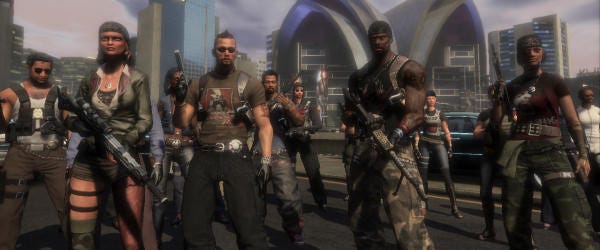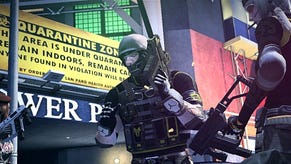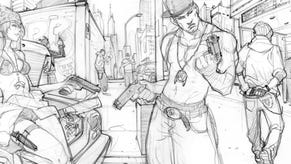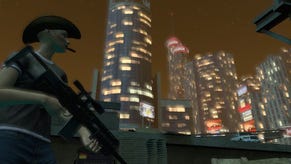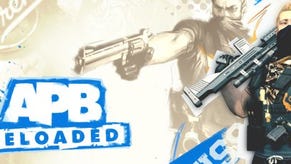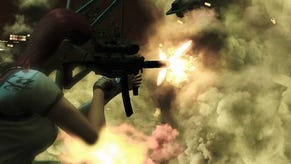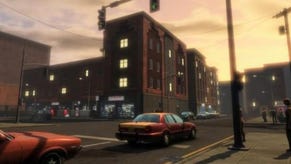RPS At E3: APB - The Most Important Game At E3
Of everything I saw at E3, APB stood out as the project with the greatest concentration of inspiration. Ignore the surprisingly crappy images that have been released so far - this one deserves your attention. During the presentation a colleague sat next to me leant in and said, "Bloody hell." A minute or so later I replied, "This is the first original idea I've seen all week." It's very easy to think of APB as an online GTA. It certainly is a game focused around either committing or preventing crimes in an open city. But what makes APB stand out is just how damned smart it is.
Let's begin with the trailer.
Many games boast of being "fully customisable", by which they mean you can choose whether your avatar is male or female, and maybe what colour hat you wear. APB is something quite different. And it only begins with character customisation. A lot of the games shown at the conference boasted of their character designing tools. Each and every one of them needed to take a trip to Realtime Worlds' private room in order to learn quite how far behind they really are. You may remember last year's teaser for this that showed some of the options, with the gag reveals of various game developers created spookily accurately in the tool - it's here. This year we were shown this in far more detail, of which a truncated version was shown on the EA stage, presented by Paul Barnett, and dodgily videoed:
Unfortunately not revealed on that occasion was the final punchline in the extended video we were shown - a character designed to look so uncannily like President Obama that it could well have been a stylised photograph. What you also can't see above is quite how ludicrously complex the tool really is. When you change a detail, like someone's weight, it's also changing the skeletal structure underneath. By having the device follow anatomical rules, you're not able to create faces that end up looking un-human. Instead the bones underneath will adapt to keep things looking natural. But shape isn't all you can adjust. How about the volume of body hair? The skin pigmentation (rather than the more common choice of five or six race archetypes, here the skin pigments are accurate recreated, creating skin colours that look natural and extraordinarily varied). Or how about the protrusion of veins? Even that detail is available for tweaking, in case you want to have your Angelina Jolie be as precise as possible. Then there's make up, contact lens colours... As Barnett comments in the video above, it seems possible to never get around to playing the game itself.
Further delaying your start, as the video above shows, the customisation goes beyond being able to create characters so distinct and recognisable that they're not going to bother with names floating above players' heads - you'll know someone when you see them. It also extends to tattoos, decals, clothes and vehicles. Creating designs in another in-game tool is so elaborate it looks like it should be its own £400 art software. Then with your created work, you can apply it as a skin tattoo, which will automatically absorb the pigmentation of the skin to which it's applied, and adjust accordingly. It will naturally wrap itself around the part of the body to which it's applied. Or perhaps you'd rather add it to clothing, where once again it is manipulated to look natural on the material to which it's applied. Maybe you want it on your car - this time it will take on the sheen or shine of the vehicle, again appropriately wrapping itself to where you stick it, intelligently cutting itself off so it doesn't obscure windows, windscreens, etc. You can then customise your vehicle, switch out body parts, wheels, even the in-car stereo.
This is beginning to sound like one of those late night infomercials where they presenter cries out, "BUT WAIT! THERE'S MORE!" It doesn't stop there. As Realtime Worlds' founder Dave Jones explained, as they develop the game they keep thinking of other things that the player would prefer to be in control of. Which includes the music. So there's a complete music creation tool in there. We were shown a couple of copyright infringing tunes that they'd made using the software (which will be an interesting thing to follow when the game comes out - it's hard to see how the money-grabbing horrors in the various music industries won't try and stamp their fat, stupid boots all over this) that demonstrated its capabilities. You can go so far as to create your own gloat tune, that will be heard by any player you kill.
There's a reason for all this, beyond just being incredibly cool. One of the key elements of APB is to be celebrity. The idea is that everyone playing can become famous for something. It might be that you're the best at head shots. Or it might be that you get killed the most often. And with the auction house that will let you sell designs, decals, tattoos, etc for in-game money, you might become the most famous leather jacket designer. You may become known as the best at creating tattoos. This fame serves to further distinguish you, further create a notorious character.
The game? The game itself? This is where the truly astonishingly clever ideas appear. You'll either play as a Criminal or an Enforcer. Each has a distinct style of play, and neither will ever have to sit in a lobby waiting for a game to play. With an intended 100 players on each server, the enormous city is also populated by NPCs who will play critical roles. Firstly they will serve as the city's initial gangs, and give missions to players. Secondly, and far more interestingly, they also provide the means by which the game's natural action flows. So let's say you're playing as a Criminal. You log into the city and want something to do right away. Why not steal a car? You may well get away with it. Take it out and go for a joyride, look for some trouble. Or you may not - you may get spotted by an NPC who will report the APB. Report it to other players playing as Enforcers. Who then come chasing after you.
Or perhaps you're an Enforcer and you hear word of a bank that's moving some money. They need security, so you show up to where it's happening. But Criminals may get wind of this and attempt to steal that money during its journey. The result of this is the game naturally creating PvP missions for players without ever having to throw up a quest screen, or have you sit around waiting for a match. It's just so smart. It means they've replaced AI players from the game with real world players.
These matches are asymmetrical. If you're especially good, especially well equipped and known by the game to be part of an especially dangerous gang, it's not going to send a couple of newbs after you. It's going to report your crime to players who will present a challenge to you. This might mean it matches up two gangs of equal strengths. But it might just as easily send in a larger number of poorer players. And this will escalate. Say your gang of three manages to take out the three players it sent after you, it might then send five to get you. Then it might alert two gangs, then three. Keep winning and it will keep raising the challenge. The notion behind this is it rewards both sides. The players seeing the game send a dozen opponents after them will recognise the respect the game is showing them. The group of twelve sent after the gang of three will love the fact they're so seemingly outnumbering their opponents.
Recognition will also be rewarded in terms of material goods. Do especially well in a city and you may be able to buy real estate. These buildings will be as customisable as everything else in the game, letting you apply your decals and colours to the walls, so everyone knows whose gang they belong to. You might even receive statues. When I asked Jones how this would work with only limited space on a server, and the likelihood of having to play in a different city when one was full, he suggested that this was mostly tough luck, although there would be some rewards so great that they would "ripple" onto multiple servers.
Balance of such a game is clearly crucial, and this is something they're still working on. The current ideas are to make it impossible to shoot players who aren't involved in the mission, but to still let anyone run anyone else over with a vehicle. The logic behind this is to ensure the matchmaking isn't defeated by griefing or drivebys, but Realtime acknowledge some will disagree. In response to this, they plan to have "chaos servers", where all such rules shall be removed, including the inability to carjack another player's car. It seemed that the main reason they intended to do this was to prove to anyone who was complaining what a bad idea it would be, and give them somewhere to find out.
Blimey, there's so many more details to report. Let's do music in the game. Jones said how most open city games tend to come with about 100 licensed tracks, but that they realised that most players would far rather listen to their own mp3 collection. But this is an online game. So they've done a deal with Last.FM to use their technology in such a brilliantly imaginative way. If you're listening to a favourite track in your car, and drive past some other players, should they have the same track on their hard drive the game will find it, and they'll hear it from your car as you go by. Should they not have it, the game will find a track that's similar and play that instead.
The same logic applies to the in-game VOIP. If you're chatting with your gang via headsets and another player walks by, they'll hear what you're saying. Using 3D positioning, these voices will appear realistically far away, getting louder as you approach.
This barrage of ideas, the attempt to put everything in the hands of the player, only falls short in one area: mission design. At launch all the prescribed missions will come from NPCs. But again, this is not intended to last. Realtime have desires to allow the most successful gangs, those that gain the most notoriety, to eventually become those who design and distribute missions to other players.
If there's a criticism to be levelled at the game at this stage it's the sparse nature of the backgrounds. While the characters and cars look remarkable, most of the scenery we saw was bland and grey. Hopefully more interesting locations will be revealed as time goes on. But beyond this, APB looks just jaw-dropping in everything from its design intricacy to its revolutionary approach to matchmaking in an MMO world. It makes PvP seem appealing to someone as single-player minded as me, and that's a hefty achievement from within my head. It's such a wealth of ideas in one game, that we can't wait to get our hands on.
